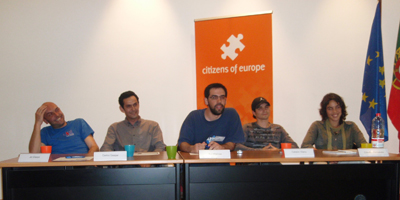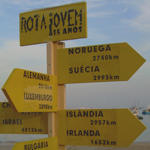
Isabella was born in Brussels and visited international kindergardens and schools. Afterwards, her German parents convinced her to go to study ‘at home’, but she did not feel comfortable in Germany. She went to Italy. Then to Sarajevo. Now she lives in London. Rui grew up in Portugal. As a pupil he went to Germany for some weeks, he spent a year at a Polish university and worked in Bulgaria, before he did a European Voluntary Service in Berlin. Now he works for a technician in conferences and travels around Europe and the world. Isabella, Rui and about twenty others discussed their experience during a three days event in Cascais, Portugal. The OpenForum 8 “Daily Europeans – Avant Garde or Dreamers?” was hosted by the NGO Rota Jovem and the municipality of Cascais.
On 13 – 15 March 2009 the participants discussed questions like the following: How can the distance between such “daily Europeans” and others be bridged? What happens if some of your peers and former friends do not understand your life, your worries, your preferences any more? What is the responsibility related to having the privilege of living a life with many opportunities? And finally: How “European” is it in the end, to live among many foreigners without real contact to the local people? To speak English all day and live without any responsibilities for anybody but yourself, as this seems to be the case for many? Throughout the workshops it became more and more clear that the people present could be described as ‚European’ in the sense that Europe is their place of living, as it defines their horizon, the area in which a large part of their friends live and in which they feel and behave „at home“.

However, regarding a political concept of ‚Europe’, there were differences. What actually united the people present was their personal background: Their language skills, their self-confidence and their education, which allow them to use the chances Europe offers to them. Finally, workshop participants addressed the responsibility of those enjoying the opportunities of Europe. We came to the conclusion that the achievements which made our way of life possible can only be sustained if as many people as possible get a chance to participate in the benefits of a uniting Europe as well. Success is only possible if Europe is not only appropriated by a privileged group but if a large majority of society perceives integration rather as a challenge than a threat. No political decision, no legislation and no policy can assure this success; it is only self-conscious and self-confident ‘Citizens of Europe’ knowing about the opportunities and taking up the responsibilities that come with them who will make it possible.
